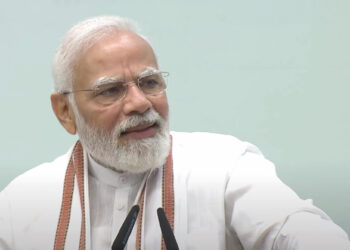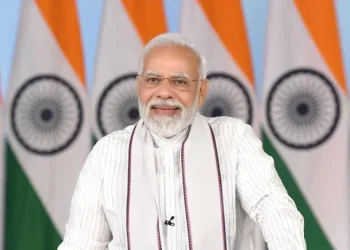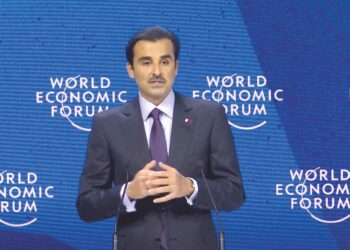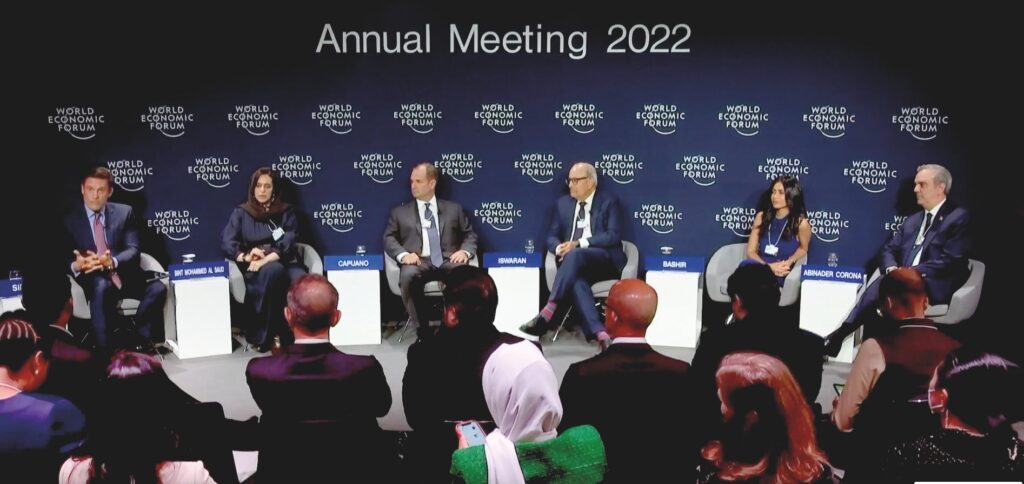
Speakers – Keir Simmons (Senior International Correspondent, NBC News), Haifa Bint Mohammed Al Saud, Anthony Capuano, S. Iswaran, Ruzwana Bashir, and Luis Rodolfo Abinader Corona.
Travel and tourism was severely impacted by COVID-19, with both trillions of dollars in GDP and over 60 million jobs lost in 2020, and the sector is now at further risk from conflict. What policies and actions can reimagine and revitalize the sector?
Keir Simmons (Moderator) – Welcome Ladies and gentlemen. Good afternoon. It’s lovely to have an intimate gathering like this, which only Davos can deliver.
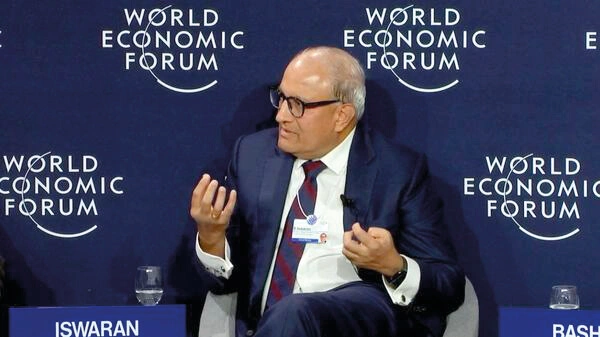
S Iswaran, Minister for Transport; Minister-in-Charge of Trade Relations, Ministry of Transport of Singapore.
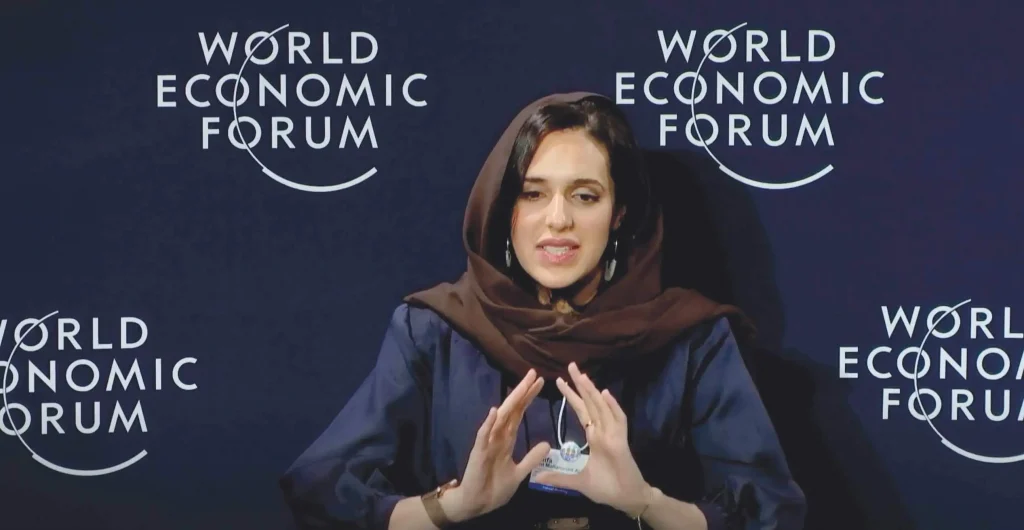
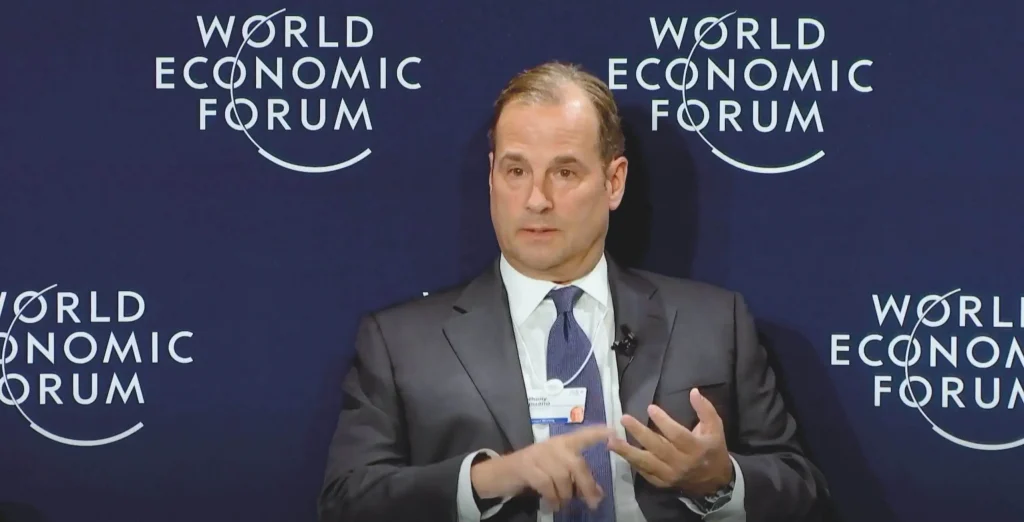
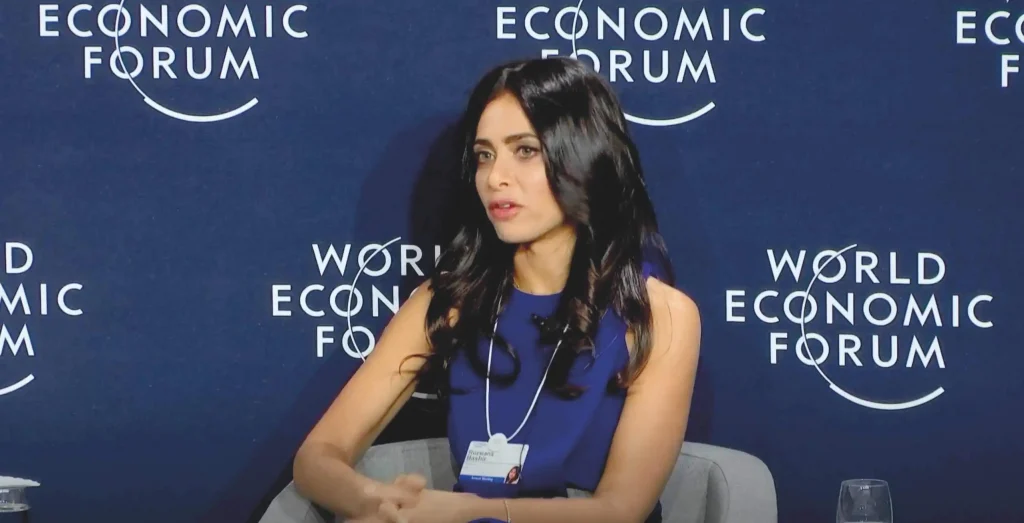
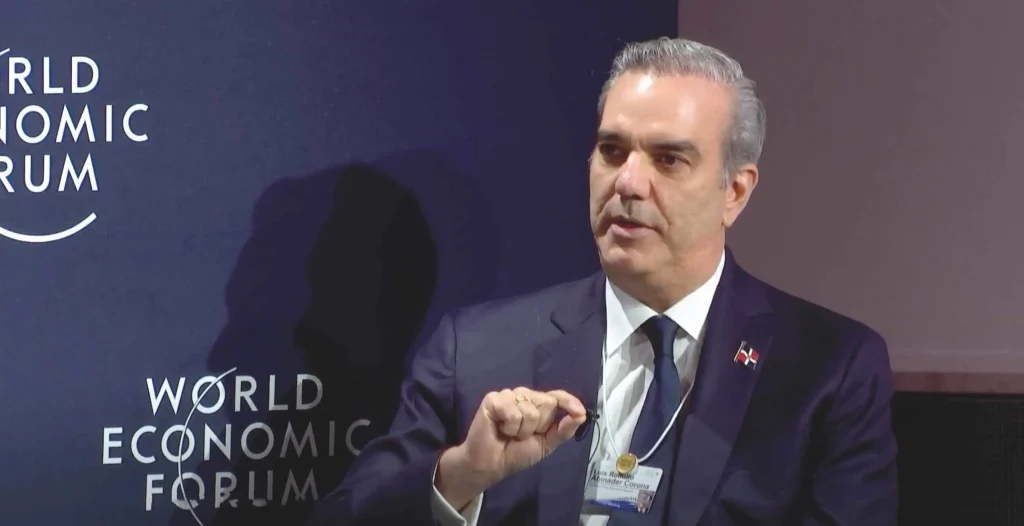
Travel and tourism was severely impacted by COVID-19, with both trillions of dollars in GDP and over 60 million jobs lost in 2020, and the sector is now at further risk from conflict. What policies and actions can reimagine and revitalize the sector?
Keir Simmons (Moderator) – Welcome Ladies and gentlemen. Good afternoon. It’s lovely to have an intimate gathering like this, which only Davos can deliver.
Let me introduce the panel. Immediately to my left is Her Royal Highness Princess Haifa Bint Mohammed Al Saud who is the Assistant Minister for Strategy and Executive Affairs, the Ministry of Tourism of Saudi Arabia, Anthony Capuano, Chief Executive Officer of Marriot International USA, Minister S Iswaran, the Minister of Transport and Minister in charge of Trade Relations in Singapore, Ruzwana Bashir, Founder and Chief Executive of Peek.com USA and also a World Economic Forum Young Global Leader and President of the Dominican Republic Luis Rodolfo Abinader Corona who will deliver remarks towards the end of the session about what he has heard and reflect on some of the lessons that we are learning.
Globalization. Those halcyon days for tourism when everything was almost on autopilot. Then came COVID and the tourism industry faced challenges. Just as the industry was hauling itself out of those difficulties then came the war in Europe with multiple routes canceled and potentially huge economic storm clouds in the future.
One view is that this is a moment to pause and reflect and think about what changes we can make to the tourism industry; how to face the issues of overcrowding the environment, and how to treat the tourism industry’s work better. Another perspective is that a crisis like this is not the time to be worrying about things like that when wars are going on around the world and despite the challenges, the industry can still thrive.
Let me begin with you Minister Iswaran. You in Singapore have seen the travel business come back strongly. What are your reflections on how things are going at this point?
Minister S Iswaran – From a global point of view, the recovery has been quite uneven. If you look at North America, Europe, and parts of the Middle East it has almost gone back to pre-COVID levels. In our part of the world because the stance has been more conservative than in many other countries recovery is a little bit further behind. Singapore has opened up its borders. We have made it very easy to travel with very minimal requirements such as vaccinations. We have in the space of a few weeks doubled volumes and are now at 50 percent of where we were pre-COVID. That’s still a long shot away from where we would like to be. But it has been a very quick recovery.
From a broader perspective of aviation and tourism recovery, we need to look at recovery, reconnection, and rejuvenation. Recovery in terms of ramp-up and keeping up with the capacity needs because the operational needs of the airports around the world have shot up and the systems have not been able to keep up which are quite evident from the crunches in the various airports. At the same time, we need to create more seamless connectivity. For instance, healthcare protocols are very uneven. Can we come upon working with health authorities and the WHO, and a standard definition of what fully vaccinated means and what are the other requirements if any, and leveraging digital technologies to put in place mutual recognition? This will serve us not just for now but for future incidents that might occur.
In terms of longer-term rejuvenation, people are talking about revenge travel, I think it’s almost like vengeful travel the way people are coming back. I would say the most important thing here is, as you asked whether it’s important to pause and take stock, as opposed to just recovering, I don’t think they are mutually exclusive; pausing and taking stock as opposed to recovery are mutually exclusive because we want to recover but it’s also an opportunity for us to learn from the pandemic and incorporate sustainability initiatives in our thinking for the future as well as in terms of how we build our capacity.
We announced last week that we are starting the Terminal Five project in Singapore. That project will incorporate some important lessons, something we paused for a couple of years. It will incorporate lessons from the pandemic, learning how to make our airport operations more modular so that you transition quickly if you need to, and the sustainability angle. It’s not about sitting and waiting. We need to take action. I think the action can be orientated both toward recovery and also the long-term rejuvenation of the sector.
Moderator – Your Highness Saudi Arabia has had great plans. You are kind of new on the block when it comes to tourism. Tell us something about those plans and are you having to rethink in the face of some of the challenges the industry is facing now?
Haifa Bint Mohammed Al Saud – Saudi Arabia being new has the advantage of looking at how everything is done. We opened as a destination just a few months before the pandemic, hence we didn’t get to test the different elements of tourism, which turned out to be a positive thing for us because we were able to look at things from different angles and aspects than more mature destinations.
We’ve learned a lot and I think the first thing we’ve learned is that the world is calling to recover and go to pre-pandemic levels. The one thing we’ve learned is that the system in itself and the sector in itself was not resilient enough to withstand the shocks that took place resulting in the sector losing four trillion dollars with a global loss of 63 million jobs. We decided to take a different view and test it out. There are three core things that we have learned to be different moving forward. First of all, domestic first. We need to focus on our local communities and put them first. This makes it more resilient in terms of opportunities, funding, and jobs. I’ll give an example. There was a Saudi Air BnB style local company that had less than 3,000 houses on their portfolio before the pandemic as we were opening up. Because we quickly focused on supporting them by giving them access to insight, data, and information, (by the way, this company is also led by a Saudi woman), and where we were going to increase demand domestically for them to properly maneuver, today the number has increased to 30,000 homes on their platform, a 700 percent increase in their expansion. With that comes more jobs and more investment. That shows how important communities and their inclusion is. Al Ula, which is one of my favorite destinations is doing that well and working with locals to help them secure the new jobs that are being created.
The second is adaptability and agility. As we test new things, we should not assume that they are correct. We should have the flexibility to go back and rethink to see what worked and what didn’t in terms of policy and framework and using data. Data is critical. We have built a data system and we have invested heavily in our foundation of data where we have integrated with over ten different government entities to have a frequency of data, availability, and accessibility all the time. We’ve got insights such as if a particular destination is seeking demand locally, so then let’s start packaging it to push people in that direction. So, we’ve seen a peak in spending of over 200 percent in that destination because of this insight and the importance of data. Finally, I would say sustainability, which His Excellency mentioned. We saw what happened to our environment during the pandemic. We saw the colors of the water returning. We have some untouched shorelines in the Red Sea and we want to preserve them. We want to ensure that as tourism returns and picks up in numbers and as we grow as a population, we need to make sure we don’t have overcrowding, we secure our heritage sites and environment sites, and look at the full value chain of sustainability within tourism from green funding to community resilience to the types of material used in these sites, which we have implemented and is working out successfully. These are the three key critical areas.
Working with key stakeholders and the private sector needs to become the norm not the exception that we do to control a crisis. It needs to be the way business is done. Because we worked with our stakeholders – Marriot for example, investment in Saudi Arabia is going to double in the next few years. We have to train Saudis for the jobs that are going to be available; around 20,000 jobs are going to be available over the next five years.
We need to take action. I think the action can be orientated both toward recovery and also the long-term rejuvenation of the sector.
Moderator – I suppose it would be much easier if you are like Saudi Arabia if you could begin with a blank piece of paper, an enormous challenge if you are Marriot dealing with legacy businesses in many cases. What do you see in change and what needs to change?
Anthony Capuano – One of the things we found remarkable about the last two years is the resilience of travel. If you look at the last two shocks to travel and the tourism sector, post 9/11 and the great recession it took about five years to come back globally. We have seen a global recovery except for China in a period of two years, which is remarkable.
As I reflect on how the business has changed, I would say one challenge and two opportunities that will endure well beyond the end of the pandemic. The challenge is around labor. Some estimates suggest one in five jobs globally that were lost during the pandemic were in the travel and tourism sector. And some of those may have likely been lost permanently. For many decades the workforce has viewed jobs in the travel and tourism sector as a safe harbor, and that confidence understandably has been shaken. So that’s an area where we have to deliberately talk about, not just as an industry and as a place to earn a fair wage, but as an opportunity to build long-term careers.
On the plus side of the ledger, is the adoption of technology. Many of us in travel and tourism developed several technology platforms well before the start of the pandemic but by necessity, we have seen our guests adopt them in droves, which I think will last beyond the end of the pandemic.
Maybe the most exciting phenomenon we’ve seen is the idea of blended trip purpose. Had this panel sat in one of our hotel lobbies in 2019 we could have identified the business traveler, a group meeting attendee, and a leisure traveler, which will be increasingly difficult, which we believe is great news for our business. By necessity, we have learned even if it’s not optimal that we can conduct business from anywhere. We see it in the day of the week booking patterns. Pre-pandemic Monday, Tuesday and Wednesday were big travel nights, Friday and Saturday leisure, while Thursday and Sunday were a bit weak because they were shoulder dates, now Thursday and Sunday have come back more rapidly than Monday, Tuesday, and Wednesday and I think it’s because people are thinking rather than taking a two-day business trip to invite family to turn it into a blended trip of five-six-seven nights, which will endure for years to come.
When we analyzed we realized that our economy will not recover if tourism doesn’t recover. We had to balance the health of the people while at the same time opening up the economy.
Moderator – Ruzwana how has your business been able to tap into that trend given that you operate a business where the experiential aspect is the focus? Have you benefitted from the changes that Tony is talking about and you have also worked hard to support those businesses in these difficult times? Tell us about it and what you have been able to do.
Ruzwana Bashir – At Peek, we help people book experiences with things that range from water sports to going zip-lining to taking an outdoor cooking class, thereby we were working with thousands of small businesses and what we found was that during COVID they were badly hit. The first thing we did was to help them get access to PPP loans and to make sure they could stay afloat. Technology became a huge part of the way we were able to assist. Nearly 17 percent of the business in the experiential space happened online before COVID. As the consumer shifted online the merchants realized that they too had to digitize and get online quickly. We already had an effective software. But we had to sell a huge uptake in that as people needed to digitize and automate. COVID brought some new challenges that technology could help whether it’s contactless payment to automating a lot of things around the workforce.
A labor shortage is something our industry has seen a lot. We were able to help both automate things so that a human wasn’t necessary to do it and also think of ways to make a job better by getting rid of the manual part that was not joyful for the people. We also introduced things like tipping and based on that the average business we work with has 10 percent higher wages for their staff based on that. This is an opportunity to acknowledge that technology can do incredible things and for us, merchants were adopting that, and with that digitization comes a whole new load of opportunities. We’re connecting the world through opportunities and we’re connecting the world through experiences but you can only do that if you’re connected to the world. The digitization in the experiential space is almost like a ten-year great leap forward in digital adoption and will help merchants rebound. Already many of them have.
In the US where we are predominant, there were almost two billion dollars of bookings. We saw that people weren’t traveling but they were doing things locally and discovering things locally. We have seen a huge amount of entrepreneurship, new businesses started during the pandemic. That’s happening because people are recognizing that people are willing to travel within 50 miles locally, maybe they are not going on a big trip, they are finding things to do at the weekend and undertaking staycations.
Within the context of mass tourism, there is more diversity of experience now. Hence lots more businesses are being started to allow people to engage with a new place in different ways as locals.
Moderator – Is there a tension between high-end experiential travel experience and mass tourism that we have seen in the previous decades? Tony spoke about the issues of employment and whether there are going to be enough jobs. But with many jobs being threatened don’t you need mass tourism to retain some of those jobs and or the type of business that you run to provide that in any way?
Ruzwana Bashir – We work with a big range and the businesses we work with might be seeing millions of people. Within the context of mass tourism, there is more diversity of experience now. Hence lots more businesses are being started to allow people to engage with a new place in different ways as locals. There are farm experiences where children could go apple picking in a local area. I think this period will allow us to recognize that there are more than three things to do at a destination. Depending on your interest there may be only three things but they can be varied. The level of entrepreneurship we have seen where businesses never existed like the business called the museum of ice cream or color factory in New York aiming at locals/travelers to come and do something completely different from what might have existed. We will see more of it and hopefully help us prevent one or two places in a destination from becoming overcome with tourists.
Moderator – President Abinader do you have questions when you lead a country that has a huge element of tourism in its economy? Do you think this kind of dialogue is going to be beneficial for your people?
Luis Rodolfo Abinader Corona – Yes of course. I think all the experiences that I heard here are very good for our planification and our industry. I want to bring my experience from the presidency and how important tourism is to our economy. I arrived in government in the middle of the pandemic in August 2020 and we had started the economic recovery. 60 percent of our GDP comes from tourism and 20 percent of the workforce is employed in tourism. When we analyzed we realized that our economy will not recover if tourism doesn’t recover. We had to balance the health of the people while at the same time opening up the economy. We started doing focus group polls in the US and Canada. Canada was in complete lockdown while the US was starting to open. We learned from the focus groups that the people had several more members in their houses and they wanted to go out and when they saw the pictures of the sea and the sand, they expressed their desire to go to those places. But they were afraid of falling sick. So, we had to think and brainstorm ideas. We came up with the only COVID insurance in the world, which was free to anyone who came to the Dominican Republic. That helped build trust in the people flying into the country. It cost us more than the income, at least that was the analysis that we made. The insurance company was a public one. But do you know how many used it? Only 0.7 percent. That’s because they had to do the tests before entering the country. At the same time, we had one of the fastest vaccination programs in Latin America and hotel employees were one of the first groups to receive the vaccine.
We decided that we will not stop planning for the long term and look only at the immediate. We even decided to open a new destination called Pedernales in the south where we signed MOUs with big hotel companies starting with Marriot to open hotels and other companies. We have been the country that has recovered more in the world in terms of its tourist population. We had the best December ever. Then came Omicron and we had to stop again. As we started to recover then came the war. But we continue our efforts and marketing programs. April 2022 was the best in the history of tourism. May is also going to be the best in terms of tourism.
People used to travel for nature and then they started traveling for culture, and then they started traveling for experiences. People have started traveling for a lifestyle and meeting the like-minded.
Moderator – That sounds incredibly positive. Mr. Iswaran you said your country is 50 percent to what it was. With the economic headwinds ahead besides the other issues we have had, is there space to think about issues like overcrowding and the environment?
Minister S Iswaran – The challenges that coexist today coexisted before the pandemic in our part of the world. You are talking about a region that is growing at a much faster rate than globally in terms of energy intensity; we had to do something about it otherwise your growth will be stymied. At the same time, we are dealing with the fact that our trajectory was pushed down but we are now on the recovery. If you ask me for an assessment, I would say that recovery is going to be strong and we will get back to where we were sooner rather than later.
I think the big uncertainty in our part of the world would be China and the greater China region when and how it opens up because in terms of its share of the flows to our part of the world it’s somewhere around 20-25 percent which is not insignificant. In the meantime, the rest of Asia and the rest of the world have opened up significantly and that’s where we are seeing most of the growth. When we started the year, we had prepared ourselves for at least 50 percent of pre-COVID volumes returning this year. But we have had to recalibrate that as the growth momentum is much stronger. I think it also means that the resource constraints such as manpower issues are going to bite. It’s one thing to say that we are going to increase capacity by 50 percent but you can’t flip a switch to do that; you’ve got to bring the people and train them and get the processes running, which takes a bit of time. But these are transition problems and I am quite confident we can overcome them.
In the longer term, there is potential for growth as the hunger to travel is there and it is a function of economic growth.
Moderator – Your Highness a country like Saudi Arabia with its economic power can support the industry until it can stand on its own feet. The plan in Saudi Arabia is to make tourism contribute 10 percent of the GDP at some point. You are invested in the business changing. To what extent are you hoping Americans, and Western Europeans will fly over Paris, not go to Dubai and come to Saudi Arabia? To what extent can you rely on the enormous demand from South Asia, and China?
Haifa Bint Mohammed Al Saud – First of all, the way people travel and the reasons why people travel have changed significantly over time. People used to travel for nature and then they started traveling for culture, and then they started traveling for experiences. People have started traveling for a lifestyle and meeting the like-minded. I don’t believe anymore that it’s a matter of distance. Rather it’s a matter of what is something new that I can try and can experience and what different value proposition will this new destination give me in terms of enriching my experience, meeting new people, and coming together on shared interests. For instance, music tourism is a massively growing industry and we see the numbers skyrocket for people who travel only for music. They will travel to meet the like-minded at certain festivities and events. We are looking into all of those areas and expanding them and we have had over 2000 events over the past two years during the pandemic. The Riyadh Season festival was held in our capital and we just closed with three months of 15 million visitors. It doesn’t matter where people come from but they will come to try something new. We saw this in one of our destinations called the Al-Ahsa oasis, which is a UNESCO heritage site for one of the largest palm tree oases in the world with many farmers and farms. I visited them where I met four generations of farmers who said exactly your point. They said we used to be farmers but now it’s about agro-tourism because people visited them and wanted to experience their lifestyle. They had converted their huts where supplies were kept into little a place for accommodation. People wanted to try their experiences like going up palm trees. We realized that people would travel within the region just to try these experiences. It’s how people travel and why people travel that matters and we have seen the growth. The past is not an indication of anything. The growth that is to come is based on the value proposition and offering.
Moderator – Tony can the industry, as it is now, handle that kind of growth if that’s what we are looking at? I stayed at Marriot St Regis in the Maldives in January and they were very proud that their staff had continued to be paid although not the full wages through the pandemic which has not been easy for everybody.
Anthony Capuano – It has not been easy. From a demand perspective, we can continue to grow in the manner that was described. The labor piece is critical, however. We have to do better as an industry to not put out a ‘help wanted’ sign but to describe in explicit detail the sorts of careers that can be created in this industry. Marriot talks with great pride of its roughly 8,000 hotels, where more than half of the 8,000 general managers started in hour wage positions. We’ve got to do a better job as an industry to describe those career opportunities whether travel retreats meaningfully from globalization or builds on the localization we have seen in the last two years. We’ve got to build local capabilities and local knowledge. We are partnering extensively in the Kingdom on identifying Saudis who have an interest in travel and tourism and we have developed some programs we intend to expand to grow that talent base. We need to do that around the world.
The hotels need occupancy before they can talk about high-end. Having said that I think there is a case to be made that you need to ensure the experience is a quality one otherwise it becomes a throng and not everyone wants that.
Moderator – Is there a tension between the clear interest in trying to avoid overcrowding and protecting beautiful places while trying to get the industry to where it was? (And there is an issue here as it depends on how much money I’ve got to spend. Marriot has different kinds of hotels)
Anthony Capuano – With a 30-brand portfolio across price points we can satisfy a wide range of guests. Your first point is an interesting one. I sit on a non-profit called Save Venice. Anyone who has had the privilege of visiting Venice recently will see the canals healthier than they’ve ever been and see how easy it is to navigate the city. Tourism is the lifeblood of that city. On the other hand, the local Venetians haven’t loved their city more. Going forward trying to bring that balance to other destinations like Venice that have been over-tourism impacted is a challenge that we will have to continue to wrestle with.
Moderator – How worried are you about the economic headwinds? We have been very positive so far, but we need to be a bit realistic not just about the impact of the war in Ukraine but about the broader economic implications potentially.
Anthony Capuano – There is a growing chorus of voices indicating that we are heading towards a potential recession. Travel and tourism are not immune from the impacts of the recession. All we need to do is look at prior cycles. We tend to lag the recession by a quarter or two in terms of its impact and it will be interesting to watch this time if we slip into a global recession the amount of pent-up travel demand that exists globally, and the amount of savings. The US is about two-thirds of the Marriot’s economy and there are two trillion dollars in savings accounts today and many of them are being deployed for experiences as opposed to goods. And that may mitigate a bit of the impact of a recession on travel and tourism.
Minister S Iswaran – Historically there have been cycles in the tourism industry but what we have observed time and again is that it’s not so much the volume but the pattern of travel that changes. For example, when we see the economic circumstances becoming a little more challenging people still travel but they travel short-haul and travel in the region and travel locally. The pandemic has unlocked a whole new world of local tourism for the people. It has a wider menu/suite of offerings. Having observed the tourism industry in the last decade it is resilient and can come back and right now we are rebounding from the pandemic, which may mask some of the economic recessionary impacts. In the longer term, there is potential for growth as the hunger to travel is there and it is a function of economic growth.
Regarding your point about value versus volume, I don’t think that it is necessarily such a sharp dichotomy because if you don’t have volume there’s no point in talking about value. The hotels need occupancy before they can talk about high-end. Having said that I think there is a case to be made that you need to ensure the experience is a quality one otherwise it becomes a throng and not everyone wants that.
Anthony Capuano – I want to go back to the issue of labor. In the US we are back to about pre-pandemic levels of vacant positions, 7000 to 8000 vacant positions. Probably in the pre-pandemic times, those were spread relatively evenly across the country. Today they are more concentrated in the markets that have recovered quickly. We can drive pricing power if we deliver on the value proposition, which is greatly challenged by some of the labor shortages that we’ve experienced.
Moderator – Ruzwana a large part of your business depends on the American consumer. Looking ahead does it worry you? How do smaller businesses survive these rough seas that the tourism industry often faces?
Ruzwana Bashir – One of the advantages that the US has is a lot of Americans love to travel domestically. And I do think we are heading towards recession if we are not already in one, which means belts will be tightened. Despite that, I think there is this pent-up demand to go out and do things. Human connection matters. We like to go out, venture, and discover new things. That hasn’t gone away. If the pandemic has taught us anything it is the fact that we need more of that. What we might see is substitution. People might not go on big trips. They are going to travel close to home. I think we have to be prepared for the idea that may be some tightening and some businesses will struggle a little bit. Within the context of the US, we have seen the growth in local travel happening in a big way. I also think it’s an opportunity in business. One of the things that we recognize is that corporates are not going out and getting people in person anymore. Those offices are certainly going away.
In our industry in tech, people are not going back to the office but there is a need to have localized houses, offices, retreats, and virtual experiences. We have large companies working with us with monthly experiences for their teams that might be more virtual orientated and so you might be doing a wine tasting at home where things might be sent to you. It’s replacing a situation where people used to go into an office and had ways to engage but now, they don’t. I don’t think it’s a replacement for travel. It’s a replacement for in-office experience. It’s giving more opportunities for merchants in experiential tourism. I think that market is going to grow a lot and we are going to see many more people look for offsites and retreats where teams can meet locally even though they might be global themselves. I think we are going to see a lot of opportunities there. Without a doubt, there are going to be potential headwinds for merchants and experience operators. But I think the local has had a largely big substitution effect already and we will continue to do so.
Moderator – Has someone got to ask any questions?
Member of the audience – I am from the Royal Commission for Al Ula. One of the things we can benefit from Saudi Arabia is that we have a young population adapted to technology. I think we learned operating healthy sites and nature reserves is that shutting down should not come at the cost of people losing their jobs again. When we skill our operators they should immediately move when things close, and they will close and things will happen. So, we have to be resilient so that it shouldn’t happen again. We have to be skilled in what we call double-career. So, when a site closes, we go into content generation to create virtual experiences. We have to have a new skill-set to compensate for a visitor on-site. Our resiliency plan includes that element to skill people. Because in the past technology was a gap. It was hard to train somebody fast in the past. But the acquisition level of new skill sets is so fast now that when you train for the next 6,000 jobs not all of them need to be rendered obsolete when a pandemic happens. I think we should be creative about that.
Everything that I have said here is about hope but at the same time, in the world that we are living in you cannot plan ahead. It is a concern to plan on the type of uncertainty.
Moderator – That was an important point about being ready but at the same time for the Kingdom of Saudi Arabia there is an economic element in this in which you want this to work.
Haifa Bint Mohammed Al Saud – We want this to work. I think we are very clear on our ambitions and goals and we are working hard and achieving a lot. But the point on jobs is on point because what we are doing now is we want to leverage the pandemic and to get people skilled and trained to be ready when these jobs come again and they are going to come quickly. How can you train people when there is a lockdown? We had to quickly find solutions to create e-training programs for people to get that basic skill-set they need. We even started training baristas where they had to buy a coffee machine and learn to do it virtually. We managed to train over 110,000 people in 2021 alone. So, it’s critical to get the right skill-set ready for the jobs that are going to come quickly.
Ruzwana Bashir – The power of technology is also to make it easier for people to do their jobs. We talked about reskilling, but I think it should be about automation and how we can lower the needs. I’m from the UK. The London taxi drivers needed to know the entire city and that took years to learn. Now with a smartphone and GPS, anyone can help people get from A to B. Do you think we should leverage the opportunity technology gives us to enable and allow people to be more skilled than otherwise, they would have been?
Anthony Capuano – When we talk about the adoption of technology in our business the question, we often get is how many jobs will that help eliminate and how much will it allow you to expand margins. Certainly, we consistently look for operating efficiencies, but one of the things we believe technology does is that it enables our associates to be more engaged with the guest. They’ve chosen a career in service. They don’t want to be head down banging away on a keyboard. They want to look the guest in the eye and engage with that guest and technology is a great enabler.
Moderator – President Abinader from what you’ve heard here, as a leader of a country that depends so much on tourism, what has given you hope, what has given you concern, and what kind of conclusions do you draw?
President Luis Rodolfo Abinader Corona – I think both. There is a concern. They spoke about regional travel. I think you will see in the next 18 months a lot of regional travel. You will not see transatlantic and transpacific travel. For example, we have seen an excellent summer of tourists, especially from the Americas because they will travel less to Europe because of the concerns they have. At the beginning of the pandemic, we wanted to open hotels that were closed. So, we started financing our Dominicans who were interested to visit the hotels because they had to open. We had to prepare for the summer and winter of 2020 and 2021 when they were going to open half of the hotels. Dominican tourists were eight percent which climbed to 30 percent. It helped us to open the hotels to spend when the tourists came. We have two million Dominicans living in the United States who were the first to come as tourists to the Dominican Republic. That was regional travel specifically looking for interests and the local markets. You will see a whole matrix of possibilities. We’re seeing among the younger generation eco-tourism becoming popular. The younger generation when they go to a hotel, see whether that hotel uses plastic or has an organic restaurant and everyone knows that it’s a market that’s growing. But also, the typical market of sea and sun and beach is there. But when they go to one of our beaches in the Dominican Republic, they also want to go to Santo Domingo, which has one of the biggest colonial cities in America, but they also want to go to an ecological park. You have to have several markets as that’s what people are looking for; several types of interests, ecological, cultural, and historic. Everything that I have said here is about hope but at the same time, in the world that we are living in you cannot plan ahead. It is a concern to plan on the type of uncertainty.
Moderator – I think that’s a great summary because it pretty much sums up the complexity of the business that you are working in. Whenever I talk to you, I’m incredibly impressed by how you’ve managed to ride out these changing expectations from your consumers and let’s hope that you go from strength to strength. Thank you very much, everybody.


